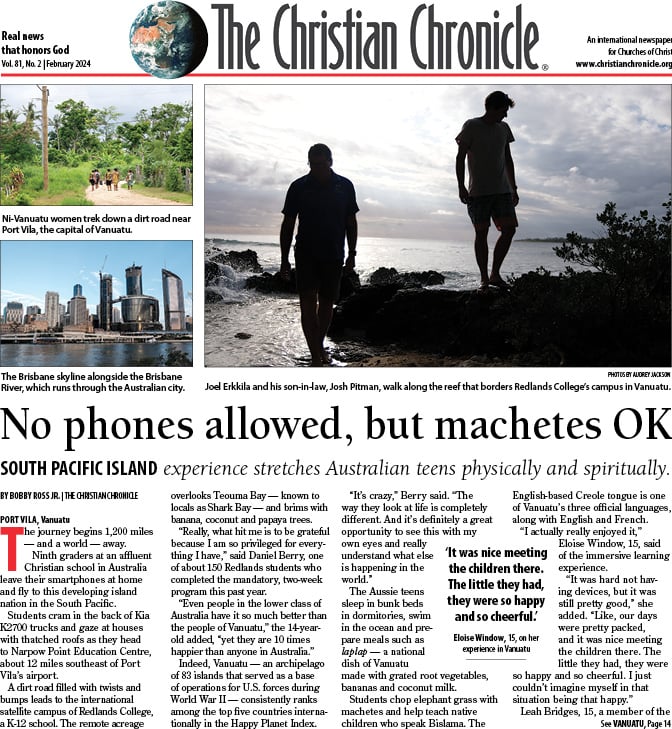Follow a simple plan for serious study of God’s inspired texts
Although the Bible is an all-time best seller, knowledge of the Bible seems to diminish each year.
In last month’s Insight, I encouraged readers of The Christian Chronicle to counter this trend by reading the Bible through in 2012.
I had many responses from people who shared that they had read through the Bible — as many as 20 to 32 times.
Some reported that the annual program of reading was challenging and discouraging. Several readers advised that using a chronological Bible with commentary by author Max Lucado simplified the process.
One reader reported that her congregation had asked all its members to follow a schedule to read the Bible through a few years back. She remembered that members challenged each other to stay on schedule, and groups gathered to discuss what they had read each week.
All these efforts encourage me, and I think the serious Bible study may be even more important year by year.
I would never classify myself as a Bible scholar, but I have read and studied the Bible since I was 12. At Christian colleges I took the required courses and enjoyed studying the texts.
Throughout my life I have continued to study, often in preparation for teaching and to know better the will of God. At church I have been in excellent studies with serious, effective teachers.
Long ago I set up files for each book of the Bible and for important topics. I store notes from lectures or sermons. I also prepare notes as I study and eventually put those notes in the files.
I am preparing to teach Paul’s letter to the Ephesians to a small group that meets every Monday through most of the year.
As a first step, I read all of Ephesians each day for a week. (Longer books usually require more than one sitting to complete, so it may take two weeks to complete the seven readings I need to get the full argument.)
Reading through Ephesians, I begin compiling a list of questions I want to answer when I dig into the text with the small group.
At this stage, I also make notes of passages that describe spiritual insights I need to work into my life. My ultimate goal in this overview reading is to create my own outline for the book.
When I finish the overview readings, I make a list of the 29 paragraphs and then write my own commentary on each paragraph, including answers to the questions I had in my initial readings.
I normally do not look at commentaries until I have completed my own commentary. When I go to other commentaries, I am looking for insights I did not see in my own study, and I will add those ideas to my notes. After I have read a few commentaries, I go to my Ephesians file to review all my previous studies.
Some books, including James, establish specific tasks and undertakings for Christians, but Ephesians deals with subtle truths about the nature of the relationship of Jesus to the Father.
The book also stresses that the believers were “predestined” for a unique relationship to Christ. It catalogues the blessing that those living in Christ have. Ephesians encourages healthy relationships within families and the importance of being prepared (the full armor of God from Ephesians 6:10-17).
You may not like all the writing I do in study. Whatever works for you is what you should do. What is important is that you set aside time and find the atmosphere suitable for serious study and thought.
Of course, what is most important in study is measuring yourself by the standards of God as revealed in his Word.
Since we have all spiritual blessings in Christ, we are obliged to seek to know and understand what our relationship means. Doing so enables us to have the fullest spiritual life.
How blessed we are that we have the Bible as God’s account of his relationship with mankind — and the inspiring texts about Jesus and his followers after his resurrection and ascension.
CONTACT [email protected].
In last month’s Insight, I encouraged readers of The Christian Chronicle to counter this trend by reading the Bible through in 2012.
I had many responses from people who shared that they had read through the Bible — as many as 20 to 32 times.
Some reported that the annual program of reading was challenging and discouraging. Several readers advised that using a chronological Bible with commentary by author Max Lucado simplified the process.
One reader reported that her congregation had asked all its members to follow a schedule to read the Bible through a few years back. She remembered that members challenged each other to stay on schedule, and groups gathered to discuss what they had read each week.
All these efforts encourage me, and I think the serious Bible study may be even more important year by year.
I would never classify myself as a Bible scholar, but I have read and studied the Bible since I was 12. At Christian colleges I took the required courses and enjoyed studying the texts.
Throughout my life I have continued to study, often in preparation for teaching and to know better the will of God. At church I have been in excellent studies with serious, effective teachers.
Long ago I set up files for each book of the Bible and for important topics. I store notes from lectures or sermons. I also prepare notes as I study and eventually put those notes in the files.
I am preparing to teach Paul’s letter to the Ephesians to a small group that meets every Monday through most of the year.
As a first step, I read all of Ephesians each day for a week. (Longer books usually require more than one sitting to complete, so it may take two weeks to complete the seven readings I need to get the full argument.)
Reading through Ephesians, I begin compiling a list of questions I want to answer when I dig into the text with the small group.
At this stage, I also make notes of passages that describe spiritual insights I need to work into my life. My ultimate goal in this overview reading is to create my own outline for the book.
When I finish the overview readings, I make a list of the 29 paragraphs and then write my own commentary on each paragraph, including answers to the questions I had in my initial readings.
I normally do not look at commentaries until I have completed my own commentary. When I go to other commentaries, I am looking for insights I did not see in my own study, and I will add those ideas to my notes. After I have read a few commentaries, I go to my Ephesians file to review all my previous studies.
Some books, including James, establish specific tasks and undertakings for Christians, but Ephesians deals with subtle truths about the nature of the relationship of Jesus to the Father.
The book also stresses that the believers were “predestined” for a unique relationship to Christ. It catalogues the blessing that those living in Christ have. Ephesians encourages healthy relationships within families and the importance of being prepared (the full armor of God from Ephesians 6:10-17).
You may not like all the writing I do in study. Whatever works for you is what you should do. What is important is that you set aside time and find the atmosphere suitable for serious study and thought.
Of course, what is most important in study is measuring yourself by the standards of God as revealed in his Word.
Since we have all spiritual blessings in Christ, we are obliged to seek to know and understand what our relationship means. Doing so enables us to have the fullest spiritual life.
How blessed we are that we have the Bible as God’s account of his relationship with mankind — and the inspiring texts about Jesus and his followers after his resurrection and ascension.
CONTACT [email protected].
-
Feedback



“Several readers advised that using a chronological Bible with commentary by author Max Lucado simplified the process.” The Bible in question is an abridged version of the Bible. Why an abridged version? Again, why not read for 18 months if you need to? The fact that it takes the earth 12 months to go around the sun is not really relevant to our Bible study plans.
USA